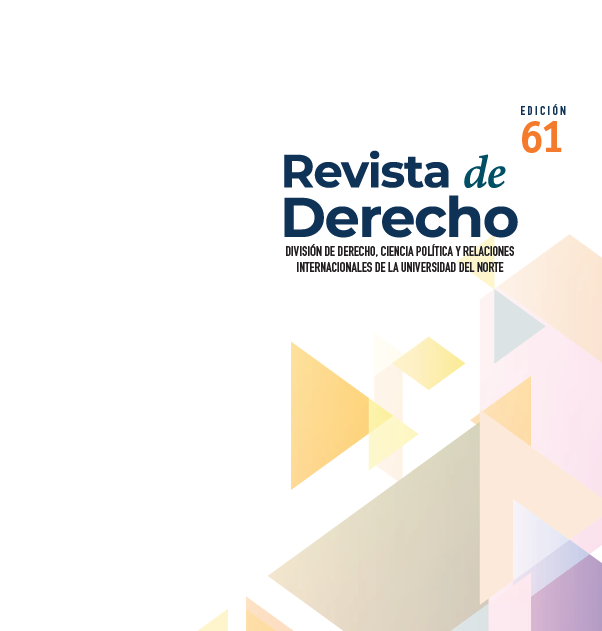The Supreme Court as Guarantor of the Rule of Environmental Law in the Government of President Jair Bolsonaro
La Corte Suprema Federal como garantia del estado de derecho ambiental en el gobierno del presidente Jair Bolsonaro
Keywords:
Populism, International Law, Transnational Law, Supreme Federal Court, Rule of Environmental LawAbstract
This paper aims to analyze the performance of the Supreme Federal Court (Brazil) in the judgments of environmental matters originating from international obligations assumed by Brazil and the posture of the government of Jair Messias Bolsonaro, which oscillates between populism and denialism. The rhetorical strategy of the heads of the federal Executive is not a recent novelty in Brazil, the last President of the Republic, following the modus operandi of other counterparts, intensified the use of populism in an attack on the international legal order and its institutions. In its functions, the Brazilian Federal Legislative was held in a mere supporting role, without a clear defense of the internationally binding legal ties to Brazil or a posture of interpellation to the Executive for the maintenance and enhancement of domestic law in the face of the law arising from outside its territory. Thus, the Supreme Federal Court assumed the condition of guarantor of transnational legal claims and international law as a brake on this negationist populism against the International Law, contemplating the prevalence of the protection of Human Rights, Democracy, the Environment Law and the Rule of Law. For the development of this research, the inductive method was used, operationalized by the operational concept techniques, bibliographic research and jurisprudential analysis.
References
Araújo, E. H. F. (2019). Globalismo: uma visão a partir do pensamento de Nietzsche. Cadernos de Política Exterior, 8, 5-14.
Arnaud, A. (2007). Governar sem fronteiras: Entre globalização e pós globalização. Lumen Juris.
Direct Action for the Declaration of Unconstitutionality n. 6.148 (2019). Questions Resolution 491 of the National Council for the Environment, which does not satisfactorily regulate acceptable air quality standards. Brasília, DF.
Direct Action for the Declaration of Unconstitutionality n. 6808 (2021). Contests the law that provides for automatic concession and without analysis of operating permits to environmental licensing for companies, within the National Network for the Simplification of registration and legalization of Companies and Business (Redesim). Brasília, DF.
Action for the Declaration of Unconstitutionality by Omission n. 59 (2020). Questions the federal government's non-availability of R$ 1.5 billion to the Amazon Fund, which provides for environmental preservation projects. Brasília, DF.
Action for the Declaration of Unconstitutionality by Omission n. 54 (2019). Action submitted by the Rede Sustentabilidade which alleges unconstitutional omission of the President of the Republic, Jair Bolsonaro, and the then Minister of the Environment, Ricardo Salles, in curbing the advance of deforestation in the Amazon. Brasília, DF.
Action Against a Violation of a Constitutional Fundamental Right n. 651 (2020). Calls for the declaration of unconstitutionality of a decree that does not provide for the participation of civil society in the National Environment Fund. Brasília, DF.
Action Against a Violation of a Constitutional Fundamental Right n. 735 (2020). States that a federal decree and an ordinance of the federal government limit the autonomy of Ibama to promote surveillance by defining that the Ministry of Defense coordinates Operation Green Brazil. Brasília, DF.
Action Against a Violation of a Constitutional Fundamental Right n. 760 (2020). Calls on the government to resume the Plan to Prevent and Combat Deforestation in the Amazon. The action was filed in November 2020 by the PSB, REDE, PDT, PT, PSOL, PcdoB, and Partido Verde parties, in conjunction with 10 other entities in the environmental segment. Brasília, DF.
Cardoso, F. H. (2013). Pensadores que inventaram o Brasil. Companhia das Letras.
Cassese, S. (2013). Chi governa il mondo? II Mulino.
Giudice, A. I. (2011). Istituire il postnazionale, identità europea e legittimazione. G. Giappichelli.
Grigori, P. (2022). Bolsonaro já respondeu Dom Phillips e o usou em post sobre “cobiça” pela Amazônia. Correio Braziliense. Available at: https://www.correiobraziliense.com.br/politica/2022/06/5015342-bolsonaro-ja-respondeu-dom-phillips-e-o-usou-em-post-sobre-cobica-pela-amazonia.html. Accessed on: 17 Jun. 2022.
Instituto Nacional de Pesquisas Espaciais (2021). Relatório Anual do Projeto de Monitoramento do Desmatamento na Amazônia Legal por Satélite. Available at: http://www.obt.inpe.br/OBT/assuntos/programas/amazonia/prodes. Accessed on: 28 Mar. 2022.
Krieger, H. (2019). Populist governments and international law. European Journal of International Law, 30, 971-996.
Peters, A. (2021). The American Law Institute’s restatement of the law: bastion, bridge and behemoth. The European Journal of International Law, 32(4), 1377-1398.
Posner, E. A. The perils of global legalism. Chicago: The University of Chicago Press.
Sassen, S. (2015). Territorio, autoridad y derechos. De los ensamblajes medievales a los ensamblajes globales. Buenos Aires: Katz.
Silva, D. S., & Derani, C. (2021). A ordem transnacional como fator de relativização da pretensão totalizante de produção de normas jurídicas pelo Estado. Revista Novos Estudos Jurídicos, 26(2), 508-529.
Staffen, M. R. (2020). Indicadores transnacionais de corrupção ambiental: a opacidade na transparência internacional. Revista de Direito Internacional, 17(2), 352-364.
Staffen, M. R. (2018). Interfaces do direito global. Rio de Janeiro: Lumen Juris.
Tasquetto, L. S., & Roriz, J. H. (2020). “Deus em Davos”: populismo, neoliberalismo e direito internacional no governo Bolsonaro. Revista de Direito Internacional, Brasília, DF, 17 (2), 122-123.
Vardélio, A., & Vilela, P. R. (2020). Bolsonaro diz que novo marco da biodiversidade deve considerar crise: presidente discursou na Cúpula da Biodiversidade da ONU. Available at: https://agenciabrasil.ebc.com.br/politica/noticia/2020-09/bolsonaro-diz-que-novo-marco-da-biodiversidade-deve-considerar-crise. Accessed on: 13 Jun. 2022.
Ventura, D., & Martins, J. (2020). Between Science and populism: the Brazilian response to COVID-19 from the perspective of the legal determinants of Global Health. Revista de Direito Internacional, Brasília, 17 (2), 67-83.
Whytock, C. A. (2012). Transnational judicial governance. St John’s Journal of International & Comparative Law, 02(1), 55-68.
Downloads
Published
Issue
Section
License
Los artículos publicados en la Revista de Derecho y todo su contenido se encuentran bajo licencia Creative Commons CC BY. Creative Commons Attribution 3.0.








